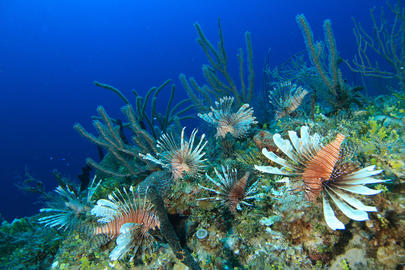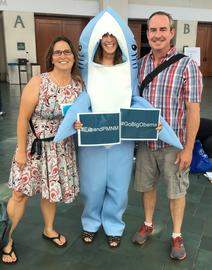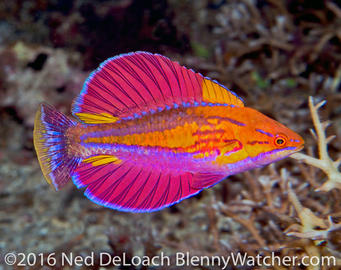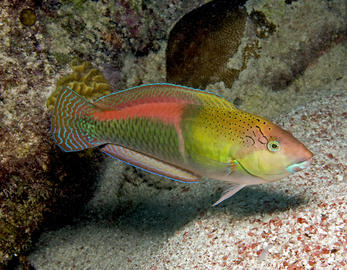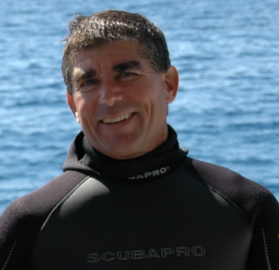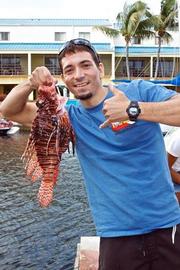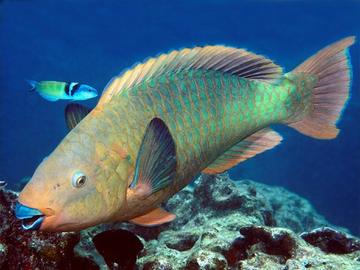The highly-anticipated sequel to Disney and Pixar’s “Finding Nemo”, “Finding Dory” opened in theaters in June, and was recently announced to be the highest-grossing animated film of all time. The titular character, Dory, is a Palette Surgeonfish (Paracanthurus hepatic), who spends the film searching for her family. Native to the tropical waters of the Western Pacific Ocean (REEF’s Central Indo-Pacific and South Pacific regions), these bright blue, reef-dwelling, algae-eating fish are also referred to as Pacific Blue Tangs, Hippo Tangs, or Regal Tangs.
We have one week left in our summer matching campaign, and want to thank everyone who has given so far. This summer, we are highlighting all the amazing discoveries made possible by generous donations from members like you!
To make a contribution, please visit www.REEF.org/donate.
In June, REEF Director of Science, Christy Pattengill-Semmens, attended the 2016 International Coral Reef Symposium meeting held in Hawaii. This conference, held every four years, brings together several thousand scientists, policy makers, and managers to discuss coral reefs and share latest research. During the week, Dr. Brice Semmens from Scripps Institution of Oceanography, presented an analysis of REEF survey data collected by volunteers in Bonaire Marine Park over the last 20 years. This valuable citizen science dataset includes over 22,000 surveys and 26,000 hours of underwater time.
On World Oceans Day, REEF kicked off our annual summer matching campaign. Every donation that comes in through August 8, up to $40,000, will be matched dollar for dollar! We are highlighting all the exciting new discoveries REEF staff and members are making through our core programs. With your help this summer, REEF can continue to study the vast underwater world that remains largely unexplored and encompasses more than 70% of our blue planet.
Even though it's summer, we aren't slowing down on our Fishinar series (www.REEF.org/fishinars). We have two great sessions planed, reviewing fishes of the Virgin Islands and Bermuda!
- Thursday, July 14th - Less Frequently Seen Fish of Virgin Gorda with Janna Nichols
- Tuesday, August 30th - Fishes of Bermuda with Ned and Anna DeLoach
And later this year, we have even more on the schedule.
Are you looking for an Indo-Pacific adventure to Micronesia, want to dive the warm waters of the Caribbean, or aim to explore the emerald green waters of British Columbia? Join REEF to take a Dive Vacation That Counts! We still have a few spaces remaining on the following 2016 REEF Trips:
On June 22, SCUBA divers, marine conservation enthusiasts, and foodies gathered at Piccolo Ristorante in Fort Lauderdale, Florida, to attend the second annual Lionfish Tasting Dinner. During the event, patrons learned about effects of the lionfish invasion while sampling the tasty invader’s light, white meat. At the end of the evening, DiveBar, one of the night’s sponsors, presented REEF with a check for $1,500 to support our Invasive Lionfish Program.
We are excited to announce that Lad Akins, REEF Director of Special Projects, is a 2016 recipient of Diving Equipment & Marketing Association (DEMA)’s Reaching Out Award! First presented in 1989, this award honors leaders in the diving community whose significant contributions to the sport have elevated the industry on all levels. Lad will join distinguished past recipients including Jacques Cousteau, Dr. Sylvia Earle and Dr. Eugenie Clark, as well as REEF Co-Founder Paul Humann, and Board of Trustees Members Peter Hughes and Marty Snyderman.
REEF members are at the heart of our grassroots marine conservation programs. Over 60,000 divers, snorkelers, students, and armchair naturalists stand behind our mission.
This month we highlight Adam Nardelli. Adam has been a REEF member since 2009, and he served as a REEF Intern in 2014. He has conducted 54 surveys and has participated in several of REEF's programs. Here’s what Adam had to say about REEF:
When and how did you first volunteer with REEF or become a REEF member?
Every month, scientists, government agencies, and other groups request raw data from REEF’s Fish Survey Project database. Here is a sampling of who has asked for REEF data recently and what they are using it for:
- Data from St. Eustatius and St. Martin were provided to a scientist at the Sustainable Fisheries Group at UC Santa Barbara.
- Parrotfish and surgeonfish sightings data from the Caribbean were provided to scientists from Avanzados del I.P.N-Unidad Mérida, a university in Mexico, to evaluate trends in these important reef herbivores.


